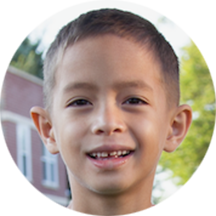
“One test of the correctness of educational procedure is the happiness of the child.”
PRIMARY | 3 - 6 years
Foundation for learning
Focus on the whole child
The Montessori Primary curriculum is truly a gift to your child. It doesn’t just focus on a set of academic skills or a body of knowledge. Instead it focuses on the development of the whole person. It is designed to support the child’s intellectual, physical, emotional and social development through active exploration, choice and independent learning. It serves as the early and general foundation that will guide your child for the rest of his life.
Our children experience the joy of independence and responsibility
In most instances, children who don’t do things for themselves haven’t been given the opportunity to learn or simply haven’t been given the chance. We provide both. We show children how to take care of their own needs and provide many opportunities to practice. When they can successfully care for themselves and the environment in which they live, they not only build confidence and independence, but responsibility and self-discipline.
Learning takes place through independent exploration
A large portion of the day, the children work independently. Your child is free to choose an activity from a full set of scientifically designed Montessori learning materials. These materials help to develop a new skill or reveal a new concept through the child’s use and exploration. Some provide the opportunity to perfect the practical skills of caring for one’s own needs or for the classroom environment. Some materials enrich vocabulary and open the door to writing, reading and the parts of speech. Some inspire interest in the world around us leading to great exploration of geography, history, the physical and natural sciences. Others build on your child’s natural interest in counting and introduce an understanding of the decimal system and the processes of addition, subtraction, multiplication and division. Some encourage artistic self-expression through the introduction of skills and media. The physical manipulation of these materials builds a foundation of concrete experiences of abstract concepts, such as mathematics, assisting your child to a deeper level of understanding.
The classroom is child-centered, not teacher-centered
Your child moves through the sequence of these activities at his own pace and repeats these activities until he’s achieved mastery. The teacher acts as a guide, noting where your child may be struggling or gaining mastery, ready to present new lessons and challenges to keep him actively engaged throughout his development.
Individualized learning in a mixed-age class
Because the curriculum is individualized, your child can work independently while participating in a mixed age classroom community. A three-year-old literally and figuratively looks up to a six-year-old. The older children help the younger children tidy spills, polish correctly, learn map vocabulary. The six-year-old has an opportunity to practice leadership, patience and empathy while the three-year-old has a model to emulate. This wide range encourages the best in everyone. The children form a sort of family, caring for and about one-another.
While most of the day is spent in self-guided work, there’s also time for group activity and play. The teacher gathers the group for community – for songs, to read stories or ‘grace & courtesy’ lessons that teach children how to solve conflicts or to act politely in social situations. Ample time is also given to run, dig, explore and play with friends outdoors.




